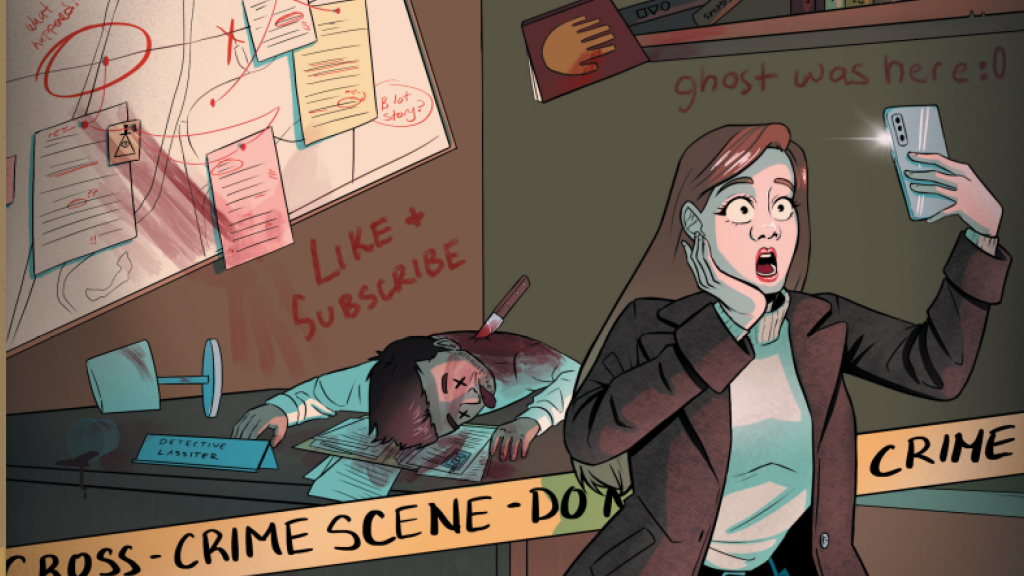Crime sells. Throughout television history, shows like "Criminal Minds," "NCIS" and "Law and Order" have fascinated, horrified and entertained audiences with dramatized stories of crime and punishment.
But these shows are stories; pieces of fiction. What happens when these dramatized narratives of gruesome murder involve real crimes that impacted real people?
True crime is one of the most popular podcast genres in the U.S., with shows like "Crime Junkie," "My Favorite Murder" and "Serial" dominating charts and drawing in millions of listeners worldwide.
Some may question the morality of true crime’s popularity — or even its very existence — due to the very real harm that can be done when people’s lives are used for entertainment value.
Truth Hurts
The 2015 Netflix docuseries "Making a Murderer" received wild popularity and became a monumental success — but the victims and families whose cases were featured did not consent to the show’s production.
As entertainment journalist and media critic, Alison Foreman, points out in her deep dive of all things true crime, facts cannot be copyrighted; regardless of whether or not somebody wants their story to be told, they are powerless to stop it.
“You can morally and ethically ‘own’ a story by nature of having lived it," Foreman explained. "But that is not accounted for in any sort of legal action that someone might take if they decided that they wanted to tell your story against your wishes.”
“You can morally and ethically ‘own’ a story by nature of having lived it."
Even if a tragic story is legally able to be told, and all parties involved give their consent, should it be?
Gary Craig, an investigative journalist for Rochester’s Democrat and Chronicle, has been involved with several true crime documentaries and has had to grapple with the ethics of telling these stories.
Although given an offer to work on a project regarding the 2012 murders of four firefighters in Webster, Craig turned down the opportunity due the the show’s themed subject matter of holiday-season crime.
“The idea of this premise of what crimes people commit during the holidays, I was turned off by it," Craig explained. "But apparently there's a market for it.”
Some shows, such as "My Favorite Murder," have been criticized for the humorous and seemingly flippant attitude with which they approach sensitive subject matter.
“I’ve done stories on stupid criminals doing stupid stuff ... but that’s very different from a homicide where you have family and others who are truly aching because of it,” Craig said.
Ethics, in this case, can become subjective. It makes it difficult to discern without having all of the information.
"I think abusing that privilege is ... very apparent, the question is, is it always apparent to the viewer unless they're doing their homework? ” Foreman explained.
The harm caused by America’s true crime obsession goes beyond just a question of ethics: irresponsible production and consumption of true crime has led to interference in active cases.
A petition to free Steven Avery — the titular murderer of "Making a Murderer" — made it all the way to the White House, as an example.
Additionally, some have taken the true crime “boom” as an opportunity to profit off of these violent crimes, with guided tours, a themed cruise and even T-shirts adorned with the faces of famous murderers.
In the midst of this frenzy, who is responsible for curating content?
The Influencers and the Influenced
True crime is a genre which blurs the lines between real life and TV — and those blurred lines are where we can open up a dialogue of how true crime can remain both ethical and entertaining.
“It’s this conversation we know we need to have about what is content, what is journalism and what’s the difference between the two ... I think true crime makes us have that conversation in a very specific way,” Foreman explained.
“It’s this conversation we know we need to have about what is content, what is journalism and what’s the difference between the two."
But whose responsibility is it to curate content on the basis of morality? Do viewers even have the power to change the types of content that are produced, or is this something that is entirely in the hands of production companies?
Foreman explained, “I tend to think, okay, that’s something where we have to turn to the streaming services ... because I think they have a better chance at tangibly impacting what ends up on screen.”
In the absence of concrete guidelines and regulations for media companies, though, that scrutiny falls to the consumer.
“I think it's ethically in all of our purview to think about what [media] we’re consuming, whether it's true crime or not,” she said.
It is a lot to ask that fans of true crime conduct extensive research on every story they encounter, and a lot to ask of showrunners to include every minute detail into a 45-minute episode.
Perhaps the best way to ensure that false narratives don’t persist lies not with one or the other, is through compromise.
“I think media that is victim sensitive without getting away from the basic tenets of journalism is important,” Craig explained.
True crime is not going anywhere any time soon, and neither is the damage associated with it — but it doesn’t have to descend even further into questionable morality either.
By assuming shared accountability, of the networks and production companies to respect the stories they profit off of, and of the viewers to consume critically, the future of true crime can be bright.
“The best thing I think true crime fans can do is ... keep asking the question, ‘Is this good for me? Is this good for the people it impacted?’" Foreman suggested. "And I think the more the listener and the viewer starts to demand that, the more we can expect that from big entertainment-producing companies.”








